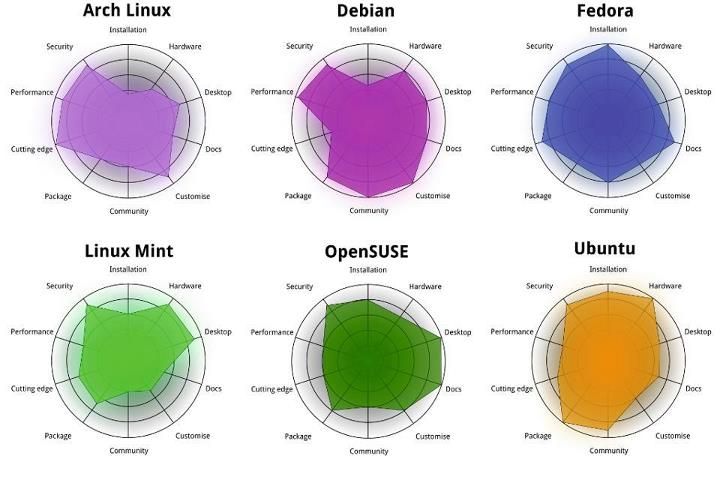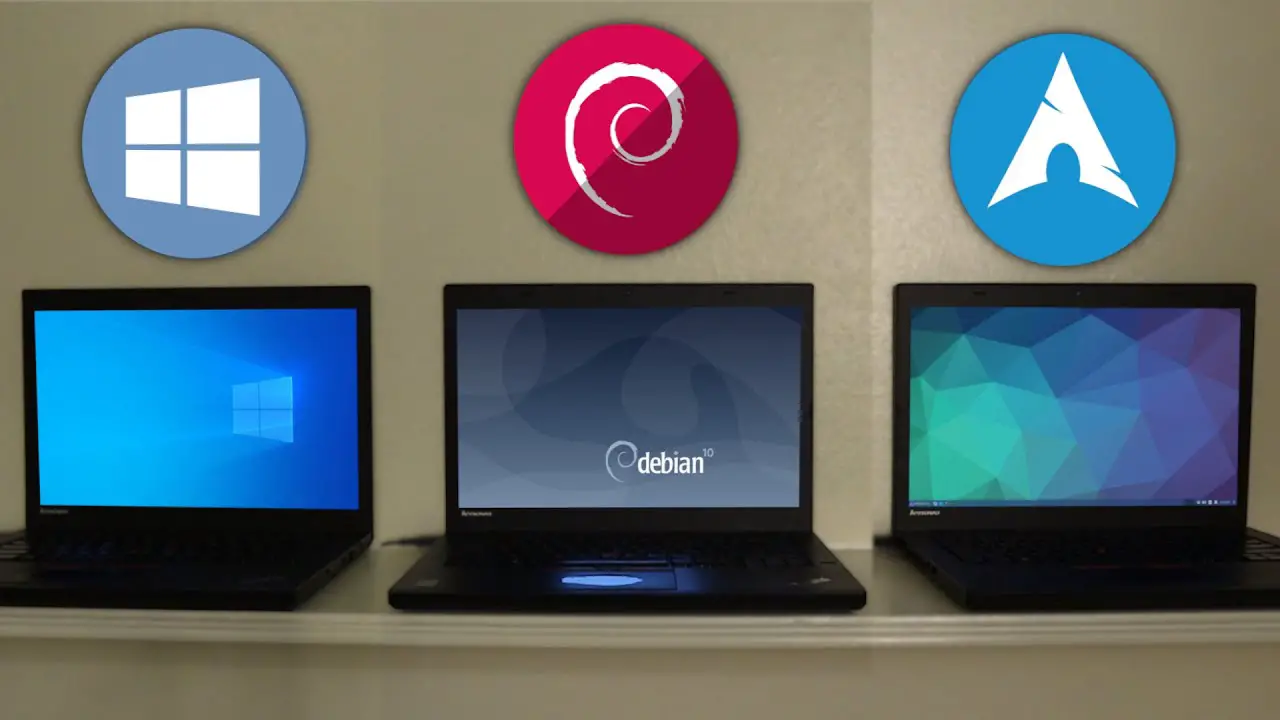Debian vs. Arch Linux: The Ultimate Free Software Showdown

Introduction

In the world of Linux distribution supremacy, the timeless giants Debian and Arch Linux often clash in a war of philosophies and fan bases. Debian, the wise and steady-going patriarch, adopts a stable and conservative approach to software. Arch Linux, on the other hand, embodies the youthful exuberance of a minimalist and rolling-release powerhouse. Each distro caters to a distinct audience and offers a unique computing experience.

Stability and Reliability: Debian
Debian’s strength stems from its unwavering commitment to stability. With rigorous testing and a conservative approach to updates, Debian users enjoy a high level of system uptime and reliability. The deliberate pace of software updates ensures that your system remains free from unexpected bugs or incompatibilities. Debian’s steadfast adherence to stability aligns with the needs of those who value consistency and dependability.
Flexibility and Customization: Arch Linux
Arch Linux is an immensely flexible and customizable distribution. Eschewing ease of use for power, Arch puts you in complete control of your system. Its rolling-release model means that you always have access to the latest software versions. The Arch User Repository (AUR), an extensive collection of user-generated packages, offers a vast array of software not found anywhere else. Arch Linux is the ideal playground for seasoned users seeking ultimate flexibility and customization.
Package Management
Debian utilizes the apt package manager, renowned for its ease of use and extensive software repository. apt makes it a breeze to install, remove, and update software with simple commands. Arch Linux employs the Pacman package manager, which is more advanced and offers granular control. Pacman allows users to monitor package dependencies and manage updates manually or with the assistance of community-developed tools.
Community and Support
Debian boasts a vibrant and highly active community forum where users can engage in discussions, seek technical guidance, and contribute to the project. The Debian team strictly enforces a code of conduct, ensuring a welcoming and respectful atmosphere. Arch Linux, on the other hand, operates a more hands-off community model. Its thriving online forums and IRC channels foster active discussions but with a higher degree of self-reliance amongst users.
Technical Complexity
Debian’s focus on stability and extensive package testing make it inherently less complex to use than Arch Linux. Its well-crafted documentation and established workflows provide a user-friendly experience. Arch Linux, in contrast, requires a higher level of technical proficiency. Its rolling-release model and minimal out-of-the-box configuration demand that users invest time and effort in system management tasks.
Conclusion
Debian and Arch Linux represent two sides of the same Linux coin. Debian is the rock-solid choice for those prioritizing stability, reliability, and ease of use. Arch Linux, on the other side, empowers experienced users with unmatched flexibility and customization. The best choice between them ultimately boils down to your individual needs and computing preferences. Whichever you choose, both distros offer a powerful and versatile foundation for your Linux computing journey.## Debian vs. Arch Linux: The Ultimate Free Software Showdown
Executive Summary
Debian and Arch Linux are considered two of the most significant free and open-source operating systems. Both are highly customizable and offer a vast array of software packages. Debian is known for its stability, while Arch is a rolling-release system appreciated for its constant updates and versatility. This article takes a detailed look at the critical aspects of both distributions to help readers understand their fundamental differences and make informed decisions based on their preferences.
Introduction
Open-source operating systems provide greater freedom and control over your computing experience than proprietary systems. They offer users the power to customize their system and access a comprehensive range of software tailored to their needs. Debian and Arch Linux stand out as top choices within the open-source community with unique strengths that cater to different user profiles, and this article delves into their features and approaches.
Stability vs. Rolling Releases
Stability: Debian places paramount importance on stability, prioritizing thorough testing and stability over cutting-edge features. It maintains a stable repository of packages, undergoing rigorous testing before being released to ensure a reliable and error-free user experience.
Rolling Releases: Arch Linux embraces a rolling release model, continuously updating its software repositories with the latest packages. This approach allows users to access new features and enhancements as soon as they are available, but it can occasionally lead to instability or compatibility issues.
Package Management
APT and Debian Packages: Debian employs Advanced Package Tool (APT) to manage software packages. Its repository includes a comprehensive selection of packages, and users can install, update, or remove them using the command-line interface (CLI) or through a graphical package manager.
Pacman and Arch User Repository (AUR): Arch Linux utilizes Pacman as its package manager, renowned for its speed and simplicity. The Arch User Repository (AUR) complements Pacman, hosting a vast collection of user-created packages that extend the operating system’s functionality.
User Experience
Out-of-the-Box Experience: Debian offers a refined out-of-the-box experience, with its default desktop environment being stable and user-friendly right after installation. This makes it a suitable choice for users who prioritize ease of use.
Customization and Flexibility: Arch Linux, on the other hand, provides remarkable flexibility, allowing users to tailor their system to their preferences. It comes with a minimal base installation, empowering users to select and install only the packages they require, resulting in a highly efficient and personalized system.
Community Support
Extensive Documentation: Debian boasts an extensive and well-established community forum, providing users with a wealth of resources, including documentation, tutorials, and technical support. Beginners and experienced users alike can benefit from the vast knowledge base and support available.
Arch Linux Wiki: While Arch Linux may not possess as extensive documentation as Debian, its wiki is renowned for its comprehensive and detailed nature. It serves as a valuable resource for troubleshooting, package installation, and understanding the inner workings of the operating system.
Conclusion
Debian and Arch Linux represent two distinct approaches to free software distribution, each catering to specific needs and preferences. Debian excels in stability and ease of use, making it ideal for users who prioritize reliability and a smooth out-of-the-box experience. Arch Linux, with its rolling releases and remarkable customization options, appeals to users seeking the latest software and a highly tailored computing environment. Ultimately, the choice between these two exceptional operating systems depends on individual requirements and preferences, and a thoughtful evaluation of their features and approaches is essential for making the most suitable decision.
Keyword Phrase Tags
- Debian vs. Arch Linux
- Free Software Showdown
- Stable vs. Rolling Releases
- Package Management
- Community Support


This article is very informative and helpful. I’m still not sure which distribution is right for me, but I’m leaning towards Debian because I want a stable system that is easy to use.
I’m not sure I agree with the author’s assessment of Arch Linux. I’ve found it to be very stable and reliable. I also appreciate the fact that it’s always up-to-date with the latest software. I would recommend Arch Linux to any experienced Linux user.
The author does a good job of explaining the differences between Debian and Arch Linux. However, I think they could have gone into more detail about the different package management systems. Debian uses APT, while Arch Linux uses pacman. These two systems are very different, and it’s important to understand the differences before choosing a distribution.
I disagree with the author’s conclusion that Debian is the best choice for beginners. I think Arch Linux is actually a better choice for beginners because it’s more customizable and up-to-date. Debian is a great choice for experienced users who want a stable system, but I think Arch Linux is a better choice for beginners.
So, the author is saying that Debian is the best choice for users who want a stable, reliable system that is easy to use. But then they go on to say that Debian can be a bit slow to adopt new software and that it can be difficult to find binary packages for some popular applications. That doesn’t sound very stable or reliable to me.
Oh, so Debian is the best choice for beginners because it’s easy to use. But Arch Linux is a better choice for beginners because it’s more customizable and up-to-date. I’m so confused. Can anyone tell me which distribution is actually the best choice for beginners?
I’m not sure what all the fuss is about. I’ve used both Debian and Arch Linux, and I think they’re both great. Debian is a great choice for users who want a stable, reliable system. Arch Linux is a great choice for users who want a rolling release distribution that is always up-to-date with the latest software. It really depends on what you’re looking for in a Linux distribution.